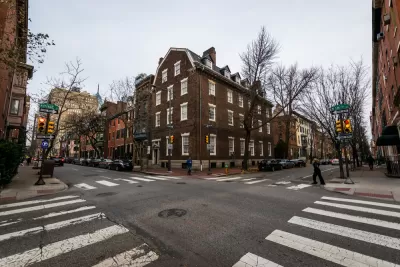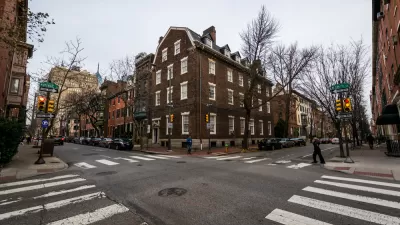One of the wealthiest neighborhoods in Philadelphia is increasing parking requirements and limiting building heights at all costs.

"Mayor Jim Kenney’s first direct veto of City Council legislation — over a bill establishing more restrictive zoning rules for the Society Hill neighborhood — has been reversed by the chamber," Ryan Briggs.
The veto override is the latest in a saga that has changed the fortunes of the downzoning on several occasions. First the Philadelphia City Council approved the rezoning over the objections of planning staff and the city's planning commission. Then Mayor Kenney vetoed the City Council's approval. Now the City Council has overridden that veto.
The Philadelphia City Council's commitment to the downzoning comes despite direct criticism of the exclusionary nature of the changes, and how that approach fits into the contemporary approach to planning in the city (i.e., it doesn’t).
The legislation will "cap the height of development along Walnut Street to just 65 feet, increase parking requirements and eliminate density bonuses granted in exchange for historic preservation," explains Briggs. "The bill would also limit building heights to 45 feet in some areas of the district spanning from Walnut to Lombard Street between 8th and the Delaware River."
The vote did reveal at least some dissent among the council, in a departure from the usual councilmanic prerogative that offers councilmembers control over land use questions in their districts. Four councilmembers voted against the override. The original legislation to implement the rezoning passed the council unanimously. Soundbites included in the article from some of the dissenting councilmembers explain the shift.
FULL STORY: Mayor Kenney’s first 2020 veto reversed in win for Society Hill Civic

Trump Administration Could Effectively End Housing Voucher Program
Federal officials are eyeing major cuts to the Section 8 program that helps millions of low-income households pay rent.

Planetizen Federal Action Tracker
A weekly monitor of how Trump’s orders and actions are impacting planners and planning in America.

Ken Jennings Launches Transit Web Series
The Jeopardy champ wants you to ride public transit.

Washington Legislature Passes Rent Increase Cap
A bill that caps rent increases at 7 percent plus inflation is headed to the governor’s desk.

From Planning to Action: How LA County Is Rethinking Climate Resilience
Chief Sustainability Officer Rita Kampalath outlines the County’s shift from planning to implementation in its climate resilience efforts, emphasizing cross-departmental coordination, updated recovery strategies, and the need for flexible funding.

New Mexico Aging Department Commits to Helping Seniors Age ‘In Place’ and ‘Autonomously’ in New Draft Plan
As New Mexico’s population of seniors continues to grow, the state’s aging department is proposing expanded initiatives to help seniors maintain their autonomy while also supporting family caregivers.
Urban Design for Planners 1: Software Tools
This six-course series explores essential urban design concepts using open source software and equips planners with the tools they need to participate fully in the urban design process.
Planning for Universal Design
Learn the tools for implementing Universal Design in planning regulations.
Heyer Gruel & Associates PA
Ada County Highway District
Institute for Housing and Urban Development Studies (IHS)
City of Grandview
Harvard GSD Executive Education
Toledo-Lucas County Plan Commissions
Salt Lake City
NYU Wagner Graduate School of Public Service



























